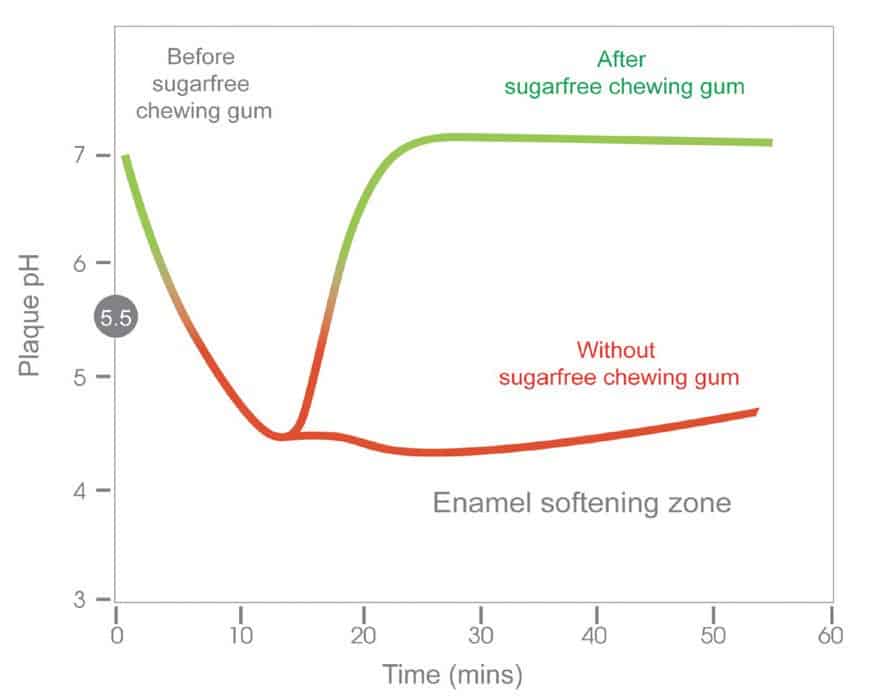Over the last 50 years our eating and drinking habits have changed considerably, with an increase in ‘grazing’ on food throughout the day, rather than eating solely at mealtimes. Grazing, especially on sugary or acidic food and drinks, increases the risk of tooth decay and acid erosion.
There are many benefits to chewing sugar-free gum regularly throughout the course of the day. Always dispose of chewing gum responsibly.
To begin with, chewing sugar-free gum increases saliva flow, which helps buffer and neutralise acids and sugars in the mouth. Saliva has an important antimicrobial and cleaning role in oral health, helping to prevent infections, whilst repairing and lubricating soft tissues. It is also important for taste, eating and swallowing food and helps maintain fresh breath.
Basically, saliva is your secret helper! You don’t notice what all it’s doing behind the scenes, until it isn’t there – which anyone who suffers from a dry mouth will tell you.
Poor saliva flow can increase your risk of tooth decay, gum inflammation, acid erosion and trauma to the soft tissues, as well as affecting speech, swallow, taste, fresh breath and overall quality of life.
Chewing sugar-free gum for 20 minutes after meals and snacks helps to stimulate saliva flow, therefore helping to neutralise plaque acids in the mouth, rinse food particles away and remineralise (harden) tooth surfaces. As beneficial as it is, chewing gum should NOT be used as an alternative to brushing and flossing teeth regularly.

Legally, chewing gum can be labelled as ‘sugar-free’ if it contains less than 0.5g of sugar per serving. In place of sugar, gum can be sweetened with high intensity sweeteners or sugar alcohols, which are different to sugar as they are non-cariogenic (do not cause tooth decay). These sweeteners cannot be broken down by plaque bacteria to form the acids which cause tooth decay and have a lower number of calories than sugar.
A natural sweetener which is increasingly found in sugar-free chewing gym is Xylitol, commonly sourced from the birch tree. Xylitol looks and tastes like sugar but has 40% fewer calories, doesn’t raise blood sugar levels and has been found to help PREVENT tooth decay and acid erosion. It is found in small amounts in many fruits and vegetables, and our bodies produce small quantities of it as part of normal metabolism.
One of the major risk factors for tooth decay is an oral bacteria called Steptococcus Mutans. These bacteria, found in plaque, live on sugars in food, from which they produce acids which cause tooth decay. These bacteria cannot use Xylitol, the way they use sugar. This means that when you chew gum containing Xylitol or use it as a sweetener, the Xylitol can starve the harmful bacteria in your mouth, reducing plaque build-up, inflammatory gum diseases and tooth decay.
Our mouth, nose and ears are all interconnected with bacteria from one impacting on the other. Xylitol-sweetened gum has been shown to reduce ear infections in children and combat candida yeast infections, common in those who wear dentures.
All that said – nothing is ever straightforward! There is some evidence that excessive gum chewing can aggravate the temporomandibular joint leading to pain and discomfort. If you have a jaw joint problems (TMJ/TMD) speak to your dental team or oral health coach to check if chewing gum regularly is recommended.
Click here to view the Growing Smiles range of Xylitol candies and chewing gum.
Finally, according to a study published in the British Dental Journal, patients who chewed sugar-free chewing gum after having their teeth whitened had less tooth sensitivity compared to those who did not chew gum. Researchers pinpointed the increase in saliva flow from the act of chewing as a likely cause of this benefit.
As you can see, the benefits of increasing saliva flow from chewing sugar-free gum following meals and snacks are clear. Just ensure the chewing gum is sugar-free and for extra tooth protection, find one which also contains Xylitol. Happy chewing!

